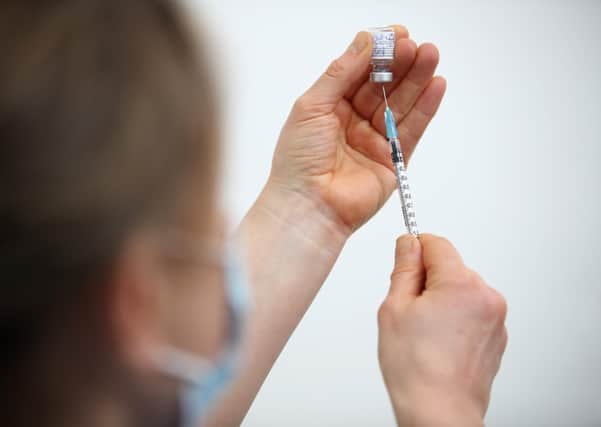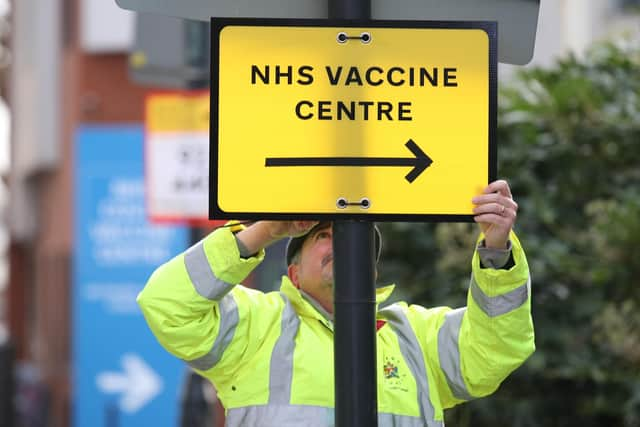Follow the science and vaccine 12 to 15-year-olds – Jayne Dowle


Whatever happened to ‘follow the science’? When it comes to vaccinating our 12 to 15-year-olds, Boris Johnson now appears hell bent on ignoring the recommendations of the Joint Committee on Vaccination and Immunisation (JCVI).
These learned men and women are against rolling out vaccinations for this age group, unless a young person has a serious underlying health condition such as neurological disease. As the mother of a 15-year-old daughter, I’m conflicted, as teenagers would say.
Advertisement
Hide AdAdvertisement
Hide AdFive days before Christmas last year, as he sounded the death knell for large family gatherings, Mr Johnson declared: “We have said throughout this pandemic that we must and we will be guided by the science. When the science changes, we must change our response.”


Strong words, so why the change of heart? Experts are cautious chiefly because receiving the second dose of the Pfizer and Moderna vaccines has been found to carry a tiny risk of causing myocarditis, or inflammation of the heart. A condition particularly prevalent in younger boys, this can cause chest pain and a pounding heartbeat. Immediate symptoms usually clear up, but the fear – amongst parents for sure – is that longer-term damage might not be obvious.
Data from America shows the numbers of children affected are very small.
For every million Pfizer second doses given to 12-17-year-old-boys, around 60 have been found to be suffering with myocarditis (compared with eight in a million among girls). The rates in this age group are higher than in older cohorts – and that’s why only one vaccine dose for 16 and 17-year-olds in the UK has been recommended by the JCVI.
Advertisement
Hide AdAdvertisement
Hide AdI also harbour my own concerns, but have learned to share my fears carefully; people are quick to judge, but I want to keep my daughter safe, in all respects.


No vaccination comes without risks, but when we are in full receipt of the facts it’s far easier to reach our own decision.
That’s why I’m finding this sudden contradiction from the Prime Minister more than concerning. Why has he now decided to ignore the science?
The problem for the Government is that once a fear is planted in the hearts and minds of parents, it is extremely difficult to dislodge.
Advertisement
Hide AdAdvertisement
Hide AdI remember the MMR controversy when my two children were toddlers, but I did choose to have them vaccinated when other parents said no. And they have had every vaccination available since, because I’ve believed in the rationale. My son, who is 19, has had both his jabs.
I don’t think I’m being unreasonable to ask why the JCVI is so against the idea of vaccinating 12 to 15-year-olds but the PM seems so keen.
Mine is not the stance of a rabid anti-vaxxer, but of a responsible adult likely to be faced with the challenge of being asked to give permission for their child to receive that jab in her arm. My daughter says I’m worrying about it far more than she is, but then again, I point out, isn’t that what parents should do?
From the start of the pandemic, we were constantly assured that the risk of serious illness, hospitalisation or death from Covid-19 complications in under-18s was minimal, unless they suffered from a life-limiting health condition.
Advertisement
Hide AdAdvertisement
Hide AdI am yet to find any guidance which shows why and how this conclusion has changed to such an extent that children over the age of 12 must be prioritised for vaccination.
There should be a clear and obvious advantage to vaccinating our sons and daughters, but this has not yet been clearly explained.
Everyone knows that most children are less likely to fall ill from Covid or spread the virus than adults, so until we’re sure that risk is minimal, it’s logical to hold off.
This is why I want straight answers. Is mass vaccination a way to prevent secondary school closures and disruption to education? If so, then someone in government should say that.
Advertisement
Hide AdAdvertisement
Hide AdOr is focussing attention on this age group paving the way for lifelong vaccine passports for all, by the back door? If this is the case, then we should most definitely be told.
The UK’s four chief medical officers are now reviewing the JCVI’s recommendation not to vaccinate 12 to 15-year-olds and their final decision is expected imminently. Until then I will continue to follow the science, even if the Prime Minister does not.
Support The Yorkshire Post and become a subscriber today. Your subscription will help us to continue to bring quality news to the people of Yorkshire. In return, you’ll see fewer ads on site, get free access to our app and receive exclusive members-only offers. Click here to subscribe.
Comment Guidelines
National World encourages reader discussion on our stories. User feedback, insights and back-and-forth exchanges add a rich layer of context to reporting. Please review our Community Guidelines before commenting.